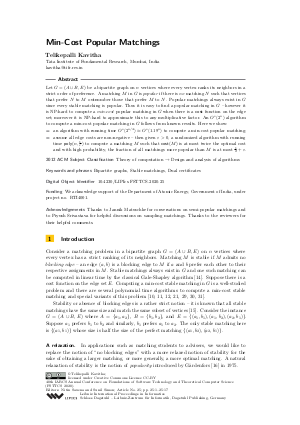@InProceedings{kavitha:LIPIcs.FSTTCS.2020.25,
author = {Kavitha, Telikepalli},
title = {{Min-Cost Popular Matchings}},
booktitle = {40th IARCS Annual Conference on Foundations of Software Technology and Theoretical Computer Science (FSTTCS 2020)},
pages = {25:1--25:17},
series = {Leibniz International Proceedings in Informatics (LIPIcs)},
ISBN = {978-3-95977-174-0},
ISSN = {1868-8969},
year = {2020},
volume = {182},
editor = {Saxena, Nitin and Simon, Sunil},
publisher = {Schloss Dagstuhl -- Leibniz-Zentrum f{\"u}r Informatik},
address = {Dagstuhl, Germany},
URL = {https://drops.dagstuhl.de/entities/document/10.4230/LIPIcs.FSTTCS.2020.25},
URN = {urn:nbn:de:0030-drops-132668},
doi = {10.4230/LIPIcs.FSTTCS.2020.25},
annote = {Keywords: Bipartite graphs, Stable matchings, Dual certificates}
}

 Creative Commons Attribution 3.0 Unported license
Creative Commons Attribution 3.0 Unported license






























